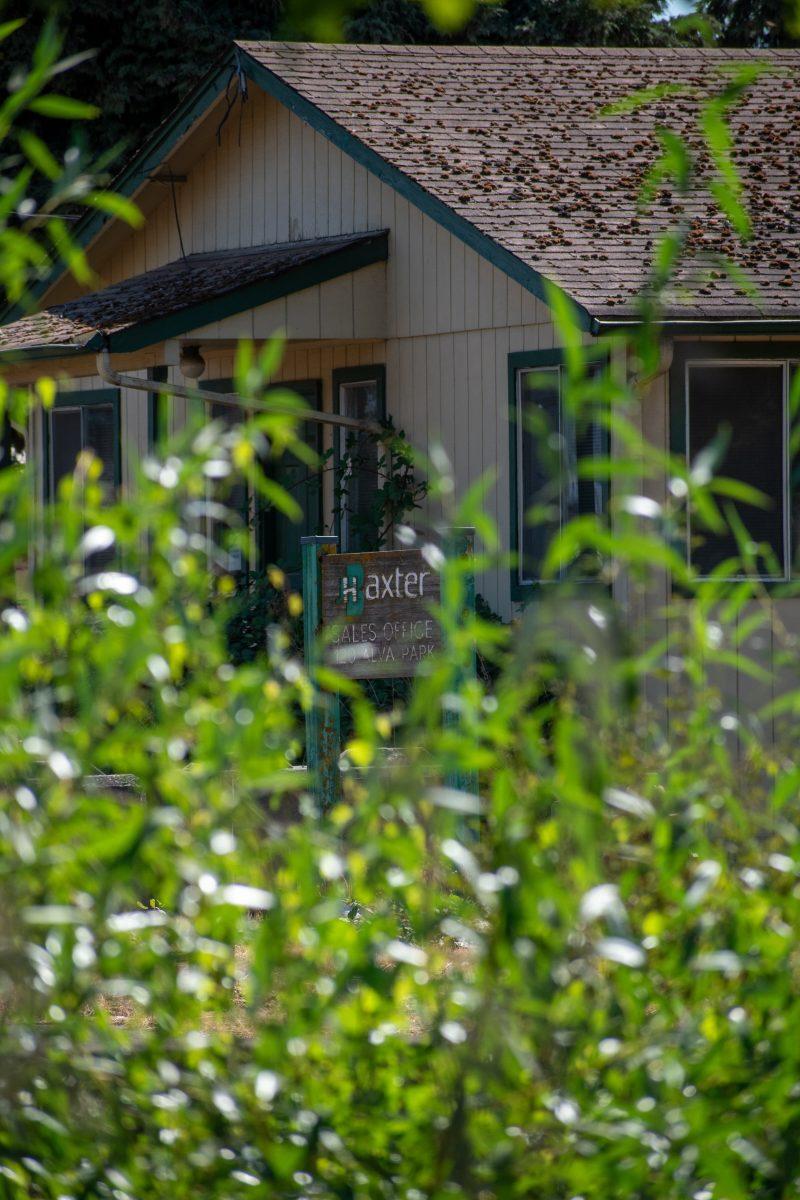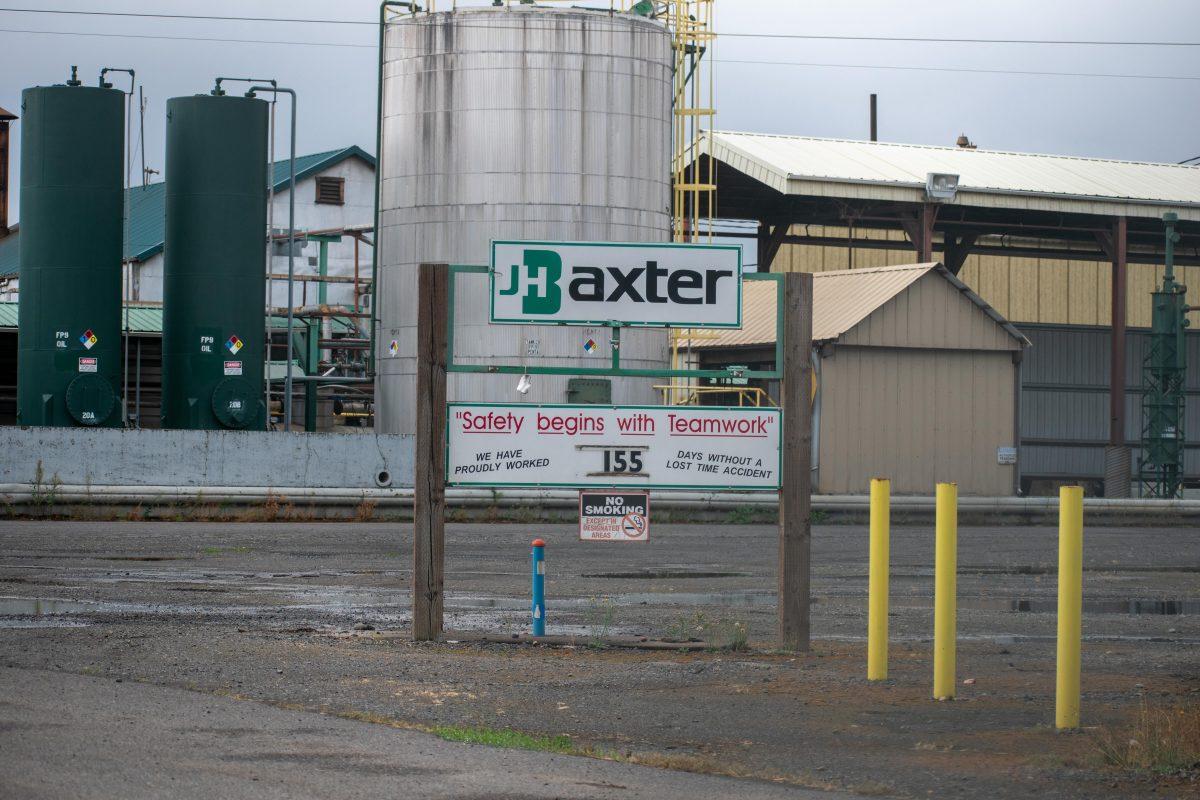Five miles west of downtown and near the city’s industrial core is Bethel-Danebo, a West Eugene community home to people who are afraid to let their children play outside or tend to their gardens. Established in 1943 as a wood treatment plant, J.H. Baxter sits on the southern border of Bethel, just across Roosevelt Boulevard. The plant has threatened the health of nearby residents through its use and disposal of harmful chemicals, according to Beyond Toxics, a grassroots nonprofit organization devoted to pursuing environmental justice across Oregon.
Since the 1980s, poorer Eugene communities have been victimized by companies that bolster and leverage their power to hemorrhage profit, according to groups like Beyond Toxics and Active Bethel Citizens. Bethel, in particular, has a higher proportion of lower-income and Latino residents than any other neighborhood in Eugene, making J.H. Baxter’s activities an issue of environmental injustice, which occurs when poor and marginalized communities are harmed by hazardous waste and other land uses that are detrimental to their health and quality of life. The harm inflicted upon Bethel residents has largely been unaddressed, advocates for the neighborhood say, but several groups are collaborating to change that.
Arjorie Arberry-Baribeault is a community organizer for Beyond Toxics. She has worked at the organization for over three years after gaining traction on Facebook for voicing her own environmental concerns. A focus of Arberry-Baribeault’s was sharing her daughter’s diagnosis of Hodgkin’s lymphoma at age 13 after they moved to Bethel.
Arberry-Baribeault also knew two Bethel residents who have had members of their family develop brain cancer, one of whom lost their life.
“You’re planting tomatoes, and you’re doing things that are supposed to be healthy for your family so that you can eat your produce. So, he’s doing that, not knowing that he’s in tainted soil, and ended up losing his life,” Arberry-Baribeault says.
J.H. Baxter closed its doors in January 2022, and the company has retreated from the mess it left behind, neighborhood advocates say. Over nearly three decades, J.H. Baxter was repeatedly fined for violating air, soil and water quality rules for burning 1.7 million gallons of hazardous waste, among other violations. The company owes over $300,000 in fines and penalties — an amount that remains outstanding.
On July 12, 2023, the Oregon Department of Environmental Quality (DEQ) and U.S. Environmental Protection Agency (EPA), hosted a hybrid meeting to delve into the history of J.H. Baxter, organize clean-up efforts and determine future actions. The two hour meeting attracted around 25 in-person attendees along with 30 online participants from Bethel and the above organizations. The meeting marked the first time in Oregon these entities have collaboratively met to address J.H. Baxter.
The chemicals of concern emitted by the industrial plant are dioxins: a highly toxic, carcinogenic compound generated as a byproduct of industrial processes that can contaminate neighboring properties. Bethel residents also have repeatedly complained about a foul odor coming from the plant.
According to the Oregon Health Authority (OHA), exposure to dioxins in neighborhoods adjacent to and around the plant and rates of two cancers — lung and Hodgkin’s lymphoma — were “marginally higher” than in other regions of Eugene. While research conducted by the DEQ shows there is no definitive link between the contamination from Baxter and the elevated cancer rates in the surrounding neighborhoods, residents challenge this.
No causal link was determined by the OHA, but exposure to high levels of dioxins has been suspected to increase the risk of inducing asthma, brain cancer, Hodgkin’s lymphoma and acute myelogenous leukemia (AML). Physiological effects include watery eyes and burning sensations in the nose. Dioxins can also infiltrate food chains by attaching to the fatty tissue of animals, posing a danger to farmers or those who cultivate produce.
A major focus of the meeting on July 12 was updating Bethel residents about dioxin contamination on their properties. The EPA has sampled the soil of a total of 52 yards, to date. In March 2023, the EPA collected soil samples from 28 yards, seven of which were found to require immediate cleanup.
However, significant delays in soil testing and remediation have occurred. Lin Woodrich, the board chair for Active Bethel Citizens, explained results can take up to four months and cleanup efforts have been postponed from this summer to this fall. “There’s just no movement,” Woodrich says.
Dylan Darling of the DEQ attributed the timeline of soil testing to the logistics of the process. Darling says the complexity of sampling is an “involved process.” Lab schedules fluctuate and change with follow-up sampling oftentimes required to extract deeper soil for accurate dioxin levels.
Beyond Toxics was also involved in the July 12 meeting. Founded in 2001, Beyond Toxics works closely with marginalized communities to hold companies that infringe on environmental rights accountable while advocating for more sustainable, safer political policies.
Arberry-Baribeault admitted the meeting was a tense moment. “I didn’t know how the community was going to receive the information they were given because there’s been so much bad news in the neighborhood and mistrust with the agencies,” she says. “West Eugene [is] crying out.”
Lisa Arkin, the executive director for Beyond Toxics, became interested in environmental law when she became a mother, which triggered deeper thought towards the environment and what would be left behind for future generations.
In discussing Lane County ranking the highest in contaminated air, Arkin says, “It’s not just Baxter.”
The Oregon DEQ found dioxins in Trainsong Park nearly a mile away but were unable to determine a definite source. The dioxins may have been emitted from J.H. Baxter, but there are also 34 other industrial polluters in the West Eugene 97402 zip code, according to the City of Eugene.
Discrepancies in soil testing have generated unease in Bethel that is apparent to those at Beyond Toxics. “There are people who just are afraid, that live in the neighborhood that didn’t know anything about dioxins, that now know they live next door to someone who had their soil tested. And they’re scared…To have somebody’s yard tested and not have your yard tested, it’s really hard to explain that to people. Everybody matters,” Arberry-Baribeault says.
Woodrich discussed how the pollution from J.H. Baxter has had a wide range of impacts, adding to Bethel’s collective unease. Some residents were alarmed by green waters in their gardens that were “bubbling.”
Other families have had their cats and dogs die of cancer, which they believe was caused by exposure to dioxins. A handful of residents also opt to harvest their own food, keeping chickens as a source of sustenance to offset lower incomes. These sources of food are now unsafe for consumption and are part of a broader, increasingly clear pattern of harm.
West Eugene has fallen victim to a situation Arkin says could have been preventable. “The owner [of J.H. Baxter], Georgia Baxter, is not lifting a finger to take care of any of this chemical [pollution] that she and her company have made profits off of for decades now. It’s just all sitting there,” Arkin says.
Ethos Magazine attempted to contact J.H. Baxter on numerous occasions, but the company did not respond to these attempts. However, Georgia Baxter wrote to the Register-Guard, saying, “We care about the health and well-being of our neighbors and employees and will continue to work diligently to protect human health and the environment.”
According to the DEQ, J.H. Baxter has been responsive to engaging in the on-going clean-up efforts despite being out of operation. The hazardous waste team at the DEQ is still performing inspections at the site, which J.H. Baxter has reportedly cooperated with. The EPA has also been involved in recent on site evaluations.
As Oregon law currently stands, there is no requirement for companies such as J.H. Baxter to hold insurance. Beyond Toxics revealed J.H. Baxter canceled its insurance prior to closing the site.
A class action lawsuit against J.H. Baxter is in motion and being handled by Chris Nidel, an attorney based in Washington D.C. Nidel filed the lawsuit in 2019 and is seeking compensation for the many Bethel residents that have been impacted by J.H. Baxter’s activities. The lawsuit was filed on the grounds that emissions detrimentally impacted home use and enjoyment.
“Baxter has poisoned the community for decades, got away with it, took their money and are basically trying to pack their bags and leave the town to deal with the clean-up and their sick kids,” Nidel says. “The question is if Baxter has any resources left to be able to pay.”
Outside of the legal arena, Beyond Toxics has made steps to improve the health and livelihoods of Bethel residents by pushing for protective policies and combatting depreciating property values through green investment. Since contaminated properties are difficult to sell, this work is critical to the agency of those in Bethel.
For one, Beyond Toxics established the Bethel Clean Energy Project, which strives to introduce clean energy into homes in the neighborhood. This includes ensuring windows are sufficiently sealed so contaminated particles cannot further infiltrate homes through the soil cleanup process. The implementation of a solar community farm to offset energy bills and encourage productive use of the derelict site have also been proposed.
Beyond Toxics is also pushing for a public health overlay zone across Eugene that, through land use codes, would mandate a quarter-mile buffer between industrial polluters and residential areas. Updates to policy and regulation would provide greater protection against those who violate the land and hold them to full account.
Ward 8 City Councilor Randy Groves is working with local and state agencies and state senator James Manning Jr. on the neighborhood’s concerns. Groves affirmed the efforts of Beyond Toxics and Active Bethel Citizens merited local government support.
“I’m familiar with the area and J.H. Baxter, and I support all measures that will help the affected part of our community restore their properties and receive the help they need and deserve,” Groves says.
The DEQ reported the first phase of clean-up efforts is scheduled to begin later this month. Seventeen trees will be removed due to contaminated soil near their roots. Ongoing processes also involve a close review of J.H. Baxter’s finances, according to the DEQ.
As efforts for combatting these problems and engaging in community outreach continue, Woodrich emphasized collaborative meetings are a critical tool. “For every part of this problem, we have somebody representing that area, [such as air and water], and we’re all getting to know each other. When there’s a question, there’s always somebody there that can look into it and bring back the information. So we’re getting answers,” Woodrich says.
There have been a total 20 Core Team meetings to date, spanning from December 2020 to September 2023. These meetings give voice to the issue, which was not always the case. Prior to Beyond Toxics and Active Bethel’s involvement, there had been no community meetings and people were not in conversation about their concerns.
Woodrich also sends out a monthly newsletter to subscribers of the Active Bethel Community to keep people informed about Baxter.
A united community with a common goal to hold Baxter accountable and facilitate clean-up efforts for residents is the armor and resilience Bethel is developing.
Arberry-Baribeault echoed Woodrich’s sentiments about the meeting. “This shows community members who have been largely marginalized that there is somebody here that has their back, and we encourage them to be involved in making changes in their lives,” she says.
J.H. Baxter suspended operations in 2022, but according to the United States Environmental Protection Agency, which is currently investigating the facility and nearby area, the tanks at the site are still filled with chemicals. The sediment, soil and water samples collected during the investigation will help the EPA determine the severity of environmental and health risks so that a plan can be created for how to move forward.








![[Photo Courtesy of the Lara Family]
Ruben embraces his beloved childhood goat, Katrina.](https://ethos.dailyemerald.com/wp-content/uploads/2025/05/katrina-1-1060x1200.jpg)


